
Django Unchained: “Negro from necro, meaning death: I overcame it so they named me after it.”
January 12th, 2013 by david brothers | Tags: Colored Commentary, curtis mayfield, django unchained, quentin tarantino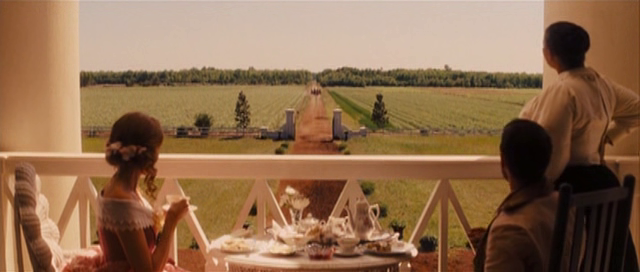
A brief burst of things I couldn’t fit into the jillion words I’ve written about Django Unchained since I saw it:
-Part of writing about Django Unchained is reading about Django Unchained. That was interesting, but it also sorta sucks. There’s a lot of pearl clutching over Quentin Tarantino daring to write the word nigger in a movie set during slavery times, whether it’s disrespectful… I thought this piece from io9 was particularly bad, on account of it suggested that Django Unchained was a white man’s fantasy without ever mentioning that basically every black person ever has had that conversation that goes “Boy, if I was around back then, I’da taken that whip from massa and shown him what a slave looks like.” (The point at the end about Django in the blue suit is weirdly infantilizing and emasculating, too.)
I picked up on a few things that most of the essays I hated did. The first is that they expected Django Unchained to have a moral, like it was Roots or something. Another was that they looked at Hildi and thought she was some type of passive damsel in distress, instead of somebody who was continually trying to escape from bondage, no matter the price she paid. That’s passive? Nah, son. She was having adventures elsewhere while Django was coming to get her. (I’d watch that movie.)
The biggest warning sign, and the only one that’s not me being petty and overly concerned with my own rightness, is when people start talking about the n-word. Does Quentin Tarantino use the n-word too much? Is it controversial for Leonardo DiCaprio to say the n-word?
Basically, if you are utterly incapable of saying the word nigger, you shouldn’t be talking about the word nigger. It’s dishonest to have that discussion and not treat the word as a real thing. I get the reasons why — you don’t want to offend people, it’s ugly, and so on — but if you’re having this conversation? You’re going to have to approach it on its own terms. I don’t think I liked a single essay that was n-word this or n-word that.
We’re adults, right? Adults use words, understand the history of those words, and understand that painful words can be used in certain contexts without offense.
So either do it or don’t, but don’t do it halfway. You want to have that conversation? Cool. Put on your adult clothes and have it.
Until you can do that, it’s grown folks talking. Shut your yap.
-I can’t tell you how happy I am that Tarantino got Anthony Hamilton on the soundtrack. The John Legend song is super hard — “Now, I’m not afraid to do the Lord’s work/ You say vengeance is his but I’ma do it first” YO! SON!!!!! — but Hamilton is that dude. He’s like… I keep comparing him to Curtis Mayfield, which is unfair and limiting. But Mayfield is legendary to me. I could listen — more like “have listened,” I’m not even kidding here — to Superfly
or Curtis or whatever for weeks at a time. Mayfield poured so much emotion and heart into his music that I just can’t get enough of it, no matter how many times I try to sing along to “Freddie’s Dead” and can’t hit the notes.
Hamilton is that dude to me nowadays. His latest album, Back To Love, is a straight tear jerker, but on that strong black man tip. It’s real soulful, and it’s real on a level that most people just cannot match these days.
When I think of people who should be singing about the black American experience more than any other person who is currently alive, it’s Anthony Hamilton. And Django Unchained needed his voice. The result is “Freedom,” a collab with Elayna Boynton, which you should listen to as you read the rest of this joint:
I know I’m talking a lot about Hamilton and not his duet partner, but trust: Boynton is a powerhouse, too. This is my introduction to her, but come payday, I’m going to find more. Her voice is amazing, that perfect mix of weathered and hopeful. Like Macy Gray + Norah Jones? I don’t know. She’s great. She sells it. She keeps up with my favorite sanger.
-Using anachronistic music was a good choice on Tarantino’s part. Setting aside the indisputable fact that there was no good music before DJ Jazzy Jeff and the Fresh Prince’s He’s The DJ, I’m The Rapper, using modern music further removes Django Unchained from being a boring, depressing, sadface slavery movie. We’re meant to enjoy this film, and the music goes a long way toward opening us up to do just that.
-“I need one hundred black coffins for one hundred bad men…” The needle dropping on that song had me fanning myself in the theater like I was in church.
-I’m incapable of objectively judging that Tupac/James Brown mash-up, mostly because they took one of the hardest JB joints and merged it with a tight Pac verse. What am I supposed to do, not like it?
-I don’t know who Brother Dege is, but “Too Old To Die Young” is great, too.
-Hildi’s last name is von Shaft, or maybe von Schaft. Regardless, Tarantino has suggested that she and Django are John Shaft’s ancestors. I like this a lot, in part because it creates a lineage for Shaft that I want to know more about. I’m used to the idea that I won’t get to know much about my ancestors past I think the mid-1800s, but I can’t tell you how obsessed I am with the idea of knowing everything. Knowing about the men and women whose existence and actions led to me… I don’t expect the Shaft line to be filled with crime fighters and crusaders — I figure Django and Hildi retired after getting out — but I want to know more.
-The first time I saw Django Unchained, I was with my cousins, none of which are as into action flicks as I am, so I had no one to debate the possibility that Tarantino beat the climactic gunfight in The Killer during the massacre at Candyland. The second time I saw it, I still didn’t have anyone to debate it with, but I realized it doesn’t need debating at all. He beat it. That shot of Django discarding one gun during the fight is everything I wanted.
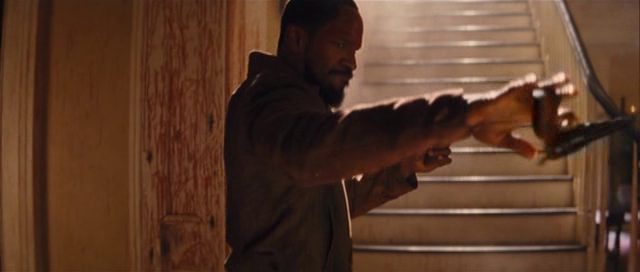
-I love that Tarantino weaponized Alexandre Dumas. I didn’t know Dumas was black (black-ish — black enough for the Klan to want to lynch him, at any rate) for years, and I love that that fact was used to slam racism and faux-intellectual culture. Calvin Candie doesn’t know anything. He’s a dilettante.
-As a result, the second-best line of the movie was “D’Artagnan, motherfucker!” when Django kicks in the door with his guns blazing. It’s vengeance and guilt, all wrapped up in one. Django was partially responsible for D’Artagnan’s death, he let it happen, so he comes back around to make it right. How does he do it? By striking in his name.
-I’ve seen a lot of people talk about how docile the slaves were in this movie, to the point where I wonder if folks saw the same flick I did. In the mandingo fight that introduces Calvin J Candie, only the whites are watching the battle. The negroes are looking away — Sheba is entirely turned away from it! — and the bartender is focused on something else. Lil Jody, breaker of eggs, watches Django with surprise by way of a hilariously placed mirror while she’s tied to a tree. The servants in Candyland during the dinner keep looking at Django like “Is this nigga for real, why does he think he can get away with this?” At the end, with the dudes in the cage? They don’t fail to leave their cage because they’re cowed and scared. They just saw a black dude murder like 80 white people, talk his way out of bondage, kill two more white dudes, blow up another, hop on a horse, take some dynamite, and ride away. That’s like eighty unthinkable things in a row, so it’s no wonder they stayed in the cage and just watched him. They were shocked. Shoot, I’d sit there, too.
Throughout the movie, the slaves pay a lot of attention to Django. They’re watching. They know how far they can push, but if they see someone else pushing? They’ll push harder.
You know the beginning of the movie, when the slaves kill that last Speck brother? They’re silent and shocked, too. They’re shocked because this ain’t the way of things, but once they’re given an option, what do they do? They choose to punish their tormentor and escape to freedom. It sets the tone for Django and Schultz’s interaction with everyone else in the movie.
Now, what do you think all those suddenly masterless slaves at the Candyland plantation and Big Daddy’s big house are doing now? Picking cotton? Nah, son.
–Django Unchained is seriously funny. “That’s not what I meant” got the biggest laughs at my first showing, back home in Georgia. It deserves it.
-Django is forced to choose between himself and his race, and that’s real interesting. His love for Hildi lets/helps him do terrible things to people. That’s a tough row to hoe.
-It’s not a slave revenge movie. It’s a movie where a slave takes revenge, yeah, but it’s not Inglourious Basterds. You can’t kill slavery as easily as killing Hitler. It was an institution that was propped up by the government, the citizens, and the culture. Hitler and his closest goons were figureheads, so you could theoretically force real change by taking them down and then taking advantage of the snake having no head. Who’re you gonna kill in 1858 to kill slavery? Everyone?
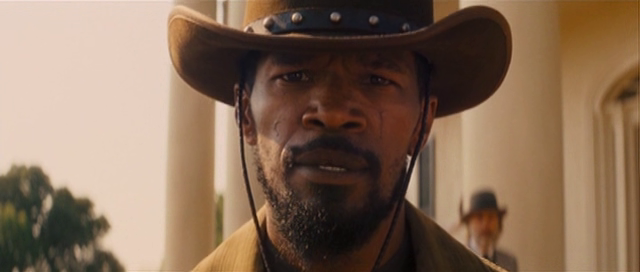
-I like that Schultz, our outsider character, loses his patience when he’s finally confronted with the real horrors of slavery. He did something to someone that they definitely deserved, but he did it at an exceedingly poor time. But, because of the bond between him and Django, he knows that if anyone can survive the aftermath of his temper tantrum, it’s Django. “Sorry. I couldn’t resist.”
And Django does. The only thing holding him back? Ammunition.
-I figure that Hamilton song is over now, yeah? Here’s Brother Dege’s “Too Old to Die Young” to wrap things up:
-Walton Goggins is one of my favorite actors, and he’s been entirely typecast as playing racists. To my recollection, the last time I saw him in a role that wasn’t a racist was in The Bourne Identity as a computer analyst, who may well have been a secret racist when not at work. But Miracle at St Anna, The Shield
, Justified
, Predators
… this guy regularly plays one of my least favorite types of people and I love him every single time.
He’s such a good actor that the racism of his characters is beside the point. He brings a real human touch to these people we usually look at as being fairly black & white or cartoonish. And his swagger as Billy Crash — best name in the movie, by the by — is incredible. There’s this shot late in the movie where several shadowed people are walking down a path. You can’t see their faces or any details, but that dude in the middle? You can tell he’s Billy Crash by how he walks.
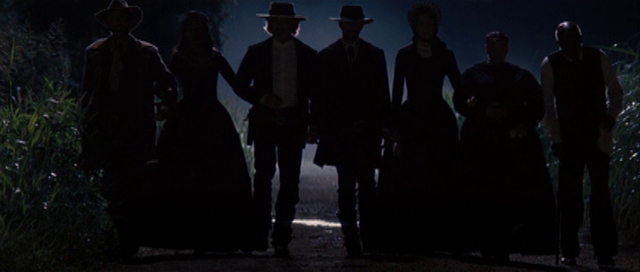
Goggins is stunning and a show-stealer, every single time. I’ll follow that guy just about anywhere at this point. I wish there was some link between Cletus van Damme and Billy Crash, but all I have to go on now are my daydreams.
You can’t underrate this dude. He’ll rock any role you give him.
-I liked this movie.
-I should have talked about Hildi more. Sorry.
-Thanks for reading.
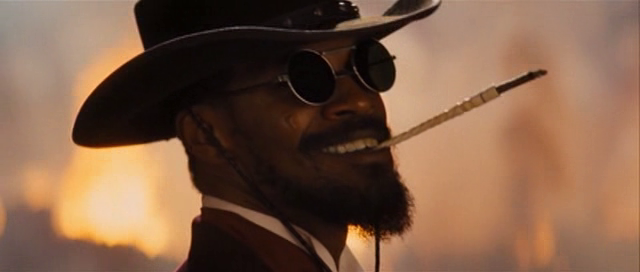
Similar Posts:
- Django Unchained: “Am I wrong ’cause I wanna get it on ’til I die?”
- Django Unchained: “Coded language, man-made laws.”
- Django Unchained: “…if someone puts his hand on you, send him to the cemetery.”
- Django Unchained: “I can’t pay no doctor bills (but Whitey’s on the moon).”
- Django Unchained: “There could never really be justice on stolen land.”

Re: “The biggest warning sign, and the only one that’s not me being petty and overly concerned with my own rightness, is when people start talking about the n-word. Does Quentin Tarantino use the n-word too much? Is it controversial for Leonardo DiCaprio to say the n-word?
Basically, if you are utterly incapable of saying the word nigger, you shouldn’t be talking about the word nigger. It’s dishonest to have that discussion and not treat the word as a real thing. I get the reasons why — you don’t want to offend people, it’s ugly, and so on — but if you’re having this conversation? You’re going to have to approach it on its own terms. I don’t think I liked a single essay that was n-word this or n-word that.
We’re adults, right? Adults use words, understand the history of those words, and understand that painful words can be used in certain contexts without offense.
So either do it or don’t, but don’t do it halfway. You want to have that conversation? Cool. Put on your adult clothes and have it.
Until you can do that, it’s grown folks talking. Shut your yap.”
The people I’ve heard objecting about others using “n-word” so much are usually those who are TOO comfortable using “nigger.”. I’m not sure that means anything but there it is.
And not everyone who says n-word ad infinitum is “incapable” in the sense of being weak. It may be a conscious choice – one of having the fortitude to not take the easy way of dropping n-bombs too much the way I sometimes drop f-bombs too much.
And even if it were out of some sense of self-preservation, we arriving in a world where that is justified. Many we might accuse of this are on television and are rightly concerned at someone will have them “on tape” saying “nigger” left and right. And they realize there can be ramifications for saying it once, too often, or even completely legitimately, in-quotes.
The potential to be taken out-of-context ought not be mocked or underestimated, especially by those who are the safest using the word, when we all probably know someone (or a whole lotta someone’s) who will stomp a bitch out -literally or figuratively,, no questions asked, for overhearing the wrong person saying what sounds like the wrong word.
Because we also all know that we are NOT “all adults” in this conversation. People screw up and enter what should be an adult conversation, relationship, or other interaction with all the wrong baggage, mindsets, and methods. We are not all on equal footing and cannot keep our conversation, context, or convictions limited to ears of the similarly-enlightened.
Dumbasses persist. But so does legitimate, living memory and pain.
As annoying as it can be to hear someone repeat “n-word” over and over, it can be damned annoying hearing “nigger” over and over. It begins to feel like abuse, like the alternative may sound like cowardice or disingenuousness. But whether you’re one of the smart ones or the dumb, one of the sensitive or the calloused, anyone using a word packed with so much venom in a conversation *about* at word is going to verbally eat away at the resolve and tolerance of those around them, who may begin to wonder about intentions of the speaker or chafe at the semantic necessity of the offense, and the whole point of a very worthwhile discussion is buried under suspicion and pain and,of course, politics.
Avoiding a landmine is a rational act.
That series was awesome. Awesome. Thanks for the work and the analysis. Going to make sure I go bad and see this a second and third time in the theater now.
I’m going to second what Lowell wrote. I’ve loved reading all these articles. I haven’t gone to see Django Unchained yet, but I’m hoping to find the time soon.
This was a really thorough and insightful series. Thanks for this.
Since we’re listing random observations here: Anyone else notice the Moebius easter egg in Django Unchained? One of the other slaves in the opening scene is called Blueberry. (“Blueberry, didn’t I give you my last apple?”) Ordinarily I’d chalk that up to coincidence, but this is Tarantino we’re talking about.
Echoing everyone else, thank you for this excellent series of articles.
I don’t think it’s possible that Billy Crash isn’t related to Shane Vendrell and Boyd Crowder with his distinctive brow and bugged out eyes full of hate.
It would be nice to see him play a character who isn’t a desperate outlaw on the fringes of society, though – maybe he could be in Man of Steel 2?
http://destructonaut.tumblr.com/post/38885628473
@West: there’s a lot of folks who think racism, or giving offense, is something that they’re tricked into doing. They don’t want to be seen as racist, see, but they still have opinions on How Those Black Kids On The Subway Talk So Loud And You Can’t Understand A Word They’re Saying. So they do that halting, shifty-eyes thing, making sure everyone else in the room is cool and/or white, before launching into a very carefully phrased observation.
David: I wish you could keep writing this series forever. It’s awesome.
One more note about Schultz: at the very beginning of the movie, he has a very frank conversation with Django about how, while he abhors slavery, he finds it convenient to have Django depending on him for shelter from social mores while he hunts the Brittle Bros. For what it’s worth, Schultz says, “I feel guilty.” (paraphrasing)
I found that to be very funny – a darkly ironic shading of modern “white guilt.” As a European, Schultz’s familiarity with slavery is going to be largely anecdotal. Sure, he hates it philosophically, but he doesn’t have the same visceral, gut hatred of it that Django, an actual slave, does.
In this light, it’s interesting to watch Schultz’s evolution over the film. He’s almost willing to break kayfabe to buy off d’Artagnan, just to save the man from being torn apart by dogs. Later, it’s revisiting this scene in his head that has Schultz so twisted with disgust that he has to forego an easy escape in order to put Candie down. He’s gone from a man who’s “sorry” that he has to play along with the conventions of slavery to a man who’s sorry that he put his friend in trouble.
Amazing. Thank you so much for your impeccably put-together collection of articles. I can’t recall the last time that written commentary moved me on so many different levels to the point that I was clenching my fist and cheering “YESSS!” at the screen…and to a fantastic soundtrack no less!
Something that wasnt explicitly stated in the movie, and something I was half expecting to hear when Schultz wanted Beethoven’s music to stop being played in Candyland, was something along the lines of this: http://open.salon.com/blog/ronp01/2009/09/27/the_african_heritage_of_ludwig_van_beethoven
Obviously, within the movie, he couldnt bear to hear the beautiful music of his homeland being played in the home of a savage, but I thought that that on top of the Dumas speech could’ve added to it. Or it would’ve been too much. Who knows?
Thank you so much for this collection of essays! The best analysis I have found amid the plethora of Django-related texts on the web, by far. They have helped me clarify my (complicated) experience the movie, and added new layers for consideration. Thank you.
Thanks for writing good things. I mean, you do that a bunch, but these were really good things.
I love your articles, specially those regarding race, but these have been my favorites. I just saw Django Unchained and I loved the movie, and these articles are great companions to the movie.
I kind of wish someone in my country had the guts (and the talent…we are kind of short in terms of good film makers) to make a revenge film in the context of the Spanish conquest of Peru; from what I’ve read, there’s lot of material, but it still is politically incorrect to touch those topics.
I noticed the Moebius easter egg! When the slave trader called out ”Blueberry,” Django turned around in a Blueberry-like fashion. 🙂 pretty clear reference.